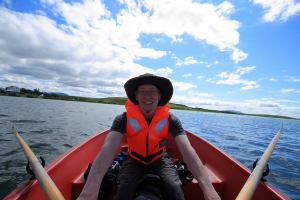 The results oriented workplace - ROWE. Now that's what I'm talking about. Let's git er' done - I don't care what you wear (just be covered up if you are in public or the office) where you do it, what time you do it, or frankly how you do it.
The results oriented workplace - ROWE. Now that's what I'm talking about. Let's git er' done - I don't care what you wear (just be covered up if you are in public or the office) where you do it, what time you do it, or frankly how you do it.
Results oriented, that is moi. Sometimes my inspiration comes in the middle of the night and I burn oil pumping out my brains through the keyboard. It's clearly not logical for me to truck it to the office at 8 or 9 or even 10 am that day. Actually, it's torture. And I should not have to feel guilt about slipping in 'late'. It's not late. I was working for you in the middle of the night for cripes sake.
Other times, I have somethingelseimportant to do. Like save a stray cat or go meet with an unemployed person during the work day, or bake cookies. Why should big brother care? Sometimes I might just need to go to a museum to soak up beauty or go find solitude away from everyone - to recharge.I don't pretty up my desk half an hour before quitting time and fly out the door when the second hand strikes end of day - sometimes I don't even know the sun went down, I'm so absorbed in making you look great.
I get the work done. I meet deadlines and then do sparkly presentations that bedazzle and tips them over the edge from warm to hot. And as long as I solve your problems in a grande way... Why do you care?Stay out of my life =)
Widget makers can't really do this of course. It doesn't mesh well with production time studies and things tend to fall off the assembly line. But it works for knowledge workers. We are transitioning to a more knowledge based economy and the number of knowledge workers increases every year. Heck, every day. At least 58% of the US workforce qualifiesaccordingto Mary Adams, co-author of Intangible Capital.
From Intangible Capital - Five things you should know about human capital (here's the pdf)
1 In the knowledge era, performance and competitive advantage are about what anorganization knows, not what it owns Today, 70% of the value of the averagecompany is intangible. This includes people, relationships and captured knowledge inprocesses, databases and intellectual property.
2 This increased importance of knowledge brings people into a central role in everybusiness Knowledge links the organization more strongly than ever to people. It isimpossible to grow a business today without people who think and learn and innovate.
3 The knowledge era is also changing how and where work can be completed Atthe same time, the knowledge era makes it possible for people to work virtually fromalmost anywhere in the world. This fact means that fewer people work in a traditionalworkplace. This flexibility can create opportunities for using the best person to do a job,no matter where they are.
4 This has created a lot of shifting (sometimes conflicting) dynamics in themanagement of people If you hire people to think, then you cannot rely on top-downdirectives to get a job done. The art of management, as never before, now requires abalance of top-down and bottom-up communication, even a balance of inside-out andoutside-in with external contractors and collaborators.
5 The best way to understand how things work is through network modeling Theorganization chart is no longer the best way to understand how work is done in anorganization. Network charts do a better job of showing the inter-relationships amongpeople as well as between people, process and external stakeholders.
My head sure bobbed up and down when I read this.
This morning I received this month's digital version of Talent Management magazine, talking about 'Work-Life Balance is not a Perk' - and a hallelujah!almost slipped out. The article is geared toward the workplace needs of millenials who will mow over boomers in the next 15 years. Is it my fault my mental gymnastics keep my mind at 28 and it wants the same thing?
Sherri Elliott-Yeary talks about the ROI of companies who offer options to meet work-life balance as fewer attendance problems, increased loyalty, reduced turnover, less time to fill positions and fewer on-the-job accidents.
No kidding, most people would happily slit a vein for position with a company offering that kind of working arrangement. And more companies who dabble in competitive intelligence are doing it. They know they have 15 years to experiment with what works and get it right as the weight of the millenial snowball rolls downhill toward them - they care about being employers of choice.
That's what I'm talking about and that's where I'm headed in my ROWE boat. More on that later. I can't talk about it just yet, I still have 4 days left to extract myself from this gig (I'm sobbing but smiling at the same time).
Photo Attribution: Bruce McAdam - Licensed under Creative Commons, some rights reserved.
Leave a Reply